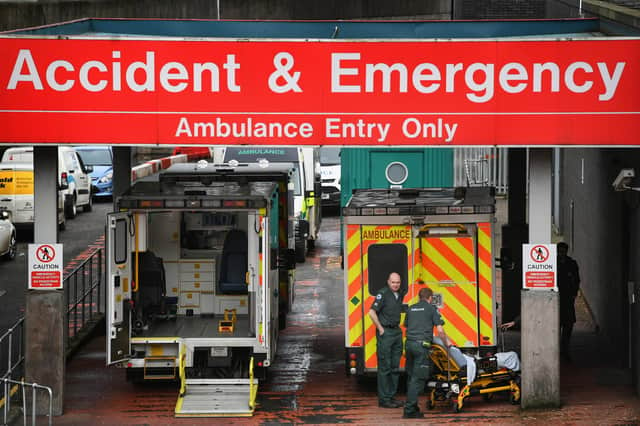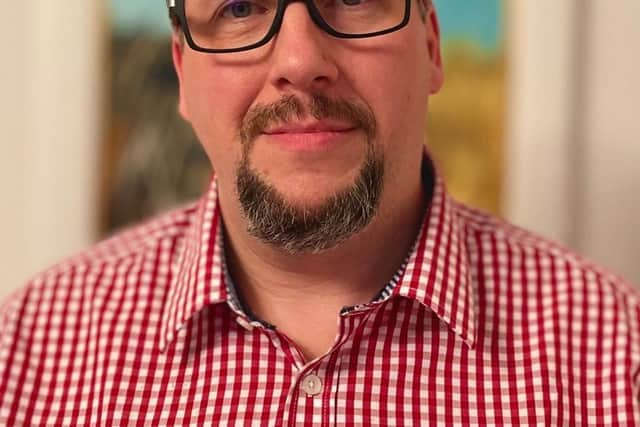300 Scots wait over 24 hours at A&E since June as conditions ‘threaten future of emergency medicine’


Between 28 June and 10 October, some 298 people in Scotland waited more than 24 hours to be seen and admitted, transferred or discharged at A&E departments, according to figures obtained by Scotland on Sunday from Public Health Scotland under the Freedom of Information Act.
This is more than the total number of people who waited that long in the previous three and half years.
Advertisement
Hide AdAdvertisement
Hide AdSince 4 July this year 42 people have waited more than 36 hours, and seven waited for more than 48 hours, a period of time described as “unimaginable” by the RCEM.


Numbers visiting A&E are currently around pre-pandemic levels, with an average weekly attendance since June of 26,213, compared to 26,762 per week across 2018 and 2019.
But staffing shortages and lack of capacity elsewhere in the health system is causing severe backlogs, and current conditions are “exceptionally demoralising” for staff, said Dr John Thomson, Vice President of the RCEM in Scotland.
He added that he would “think twice” about choosing emergency medicine as a specialism if he was a junior doctor today.
“The current conditions that everyone is working in are not right,” he said.
“We're threatening both the retention of those staff, and also future recruitment.
“It's hugely important that we improve things for the patients, but actually I think we risk the future emergency medicine workforce if things are not improved significantly in the near to immediate future.”
It comes after the college warned 231 people have died this year in Scotland as a direct result of long waits at A&E.
Advertisement
Hide AdAdvertisement
Hide AdIn response, the Scottish Government said this figure was based on data collected in England.
But Dr Thomson said it is “disingenuous” to suggest that the analysis does not apply north of the border.
The figure is based on research from the England-based project Getting it Right First Time, which found that of every 67 patients who wait longer than eight hours at A&E, accounting for the different reasons bringing them to hospital in the first place, one will die as a direct result of the wait.
“These deaths are absolutely avoidable, and unconscionable,” said Dr Thomson.
“Yes, it's England data, but patients attending emergency departments in England are no different to patients who attend emergency departments in Scotland, and it would be disingenuous for anyone to suggest otherwise.”
He added: “Within the United Kingdom there are no differences in the patient population that we see within our emergency departments.
“From a Royal College of Emergency Medicine view, from an expert view of emergency physicians who work in emergency departments, we can extrapolate that data to look at patient population in Scotland.”
The four hour standard of waiting time at A&E was introduced to prevent long waits such as these, Dr Thomson said.
Advertisement
Hide AdAdvertisement
Hide AdThe Scottish Government target is for 95 per cent of patients to be seen and admitted, transferred or discharged within this time. Currently the figure is below 70 per cent, for the first time since records began in 2015.
Dr Thomson labelled the standard “incredibly important”, as it reduces the risk of harm to patients, and is a barometer for the whole NHS and social care system.
When waiting times lengthen at A&E, this is a symptom of backlogs elsewhere.
Further preventable deaths are expected this winter as pressure mounts, Dr Thomson said.
“I expect the overall performance to continue to fall, and I expect more patients to be waiting an unnecessary length of time for a hospital bed, and as a result of that come to harm,” he said, adding that the situation is “only going to continue to deteriorate month on month over the next four to six months.”
The Scottish Government has announced a series of measures in recent weeks to support A&E departments, including a £10 million funding package.
But Dr Thomson said while these will help, they will not solve the issues.
Opposition politicians have repeatedly called on the Scottish Government to do more.
Advertisement
Hide AdAdvertisement
Hide AdLabour Health spokesperson Jackie Baillie said it is “beyond belief” that 300 Scots have been left to wait more than 24 hours at A&E.
"Behind the statistics are 300 people who, at best, experienced unnecessary anxiety and pain, and at worst, life-altering complications and death,” she said.
"A&E services are in crisis, with the situation rapidly deteriorating with every passing week.
“Lives are on the line and Humza Yousaf is a Health Secretary without a workable plan, so we have a health service in freefall.
"Action must be taken now.”
Conservative Shadow Health Secretary Dr Sandesh Gulhane called the figures “disgraceful and downright dangerous”.
“More and more lives are being put at risk due to our A&E departments being beyond breaking point,” he said.
“It is staggering that hundreds of patients have had to endure a 24-hour wait in A&E… The SNP’s own target time is for patients to be seen within four hours.
“They should be ashamed that almost 300 patients have waited over six times beyond that to be treated.”
Advertisement
Hide AdAdvertisement
Hide AdScottish Liberal Democrat leader Alex Cole-Hamilton said the news showed “there has never been a worse time to be a patient in need of a trip to A&E.”
“This week the Scottish Government issued guidance encouraging people to stay away unless the situation is critical,” he said.
"This is a temporary sticking plaster not a real solution. What's more there is a real risk that if people hold off asking for help, small problems will become much worse.
The Scottish Government did not respond to a request for comment.
A message from the Editor:
Thank you for reading this article. We're more reliant on your support than ever as the shift in consumer habits brought about by coronavirus impacts our advertisers.
If you haven't already, please consider supporting our trusted, fact-checked journalism by taking out a digital subscription.
Comments
Want to join the conversation? Please or to comment on this article.
